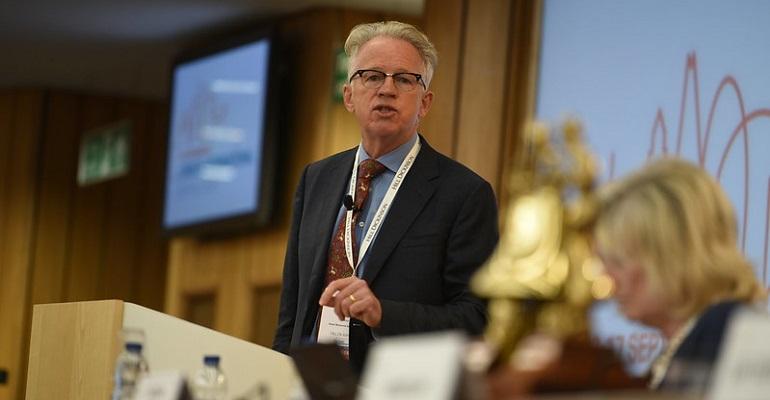The centrepiece conference of London International Shipping Week took place at IMO Headquarters where speakers from government, international bodies, NGOs and industry filled the seats usually reserved for IMO delegates.
After laying empty for 18 months, the IMO’s main chamber of debate heard honest calls for urgent action and collaboration, but it was the industry itself reflecting on unflattering truths and calling for change while the regulators and member states themselves were absent; perhaps they will catch up.
While delegates may have been in a jovial mood, glad of the return to networking and opportunity to catch up with peers, the tone of the conference was frequently blunt.
We were told that we were in the midst of a mass extinction event, that we had almost no time to act to avert climate catastrophe and that decarbonising our industry alone would cost trillions.
It felt like the industry was finally being honest with itself.
It seemed as if speakers felt empowered to be frank about what they do, what they need to do better and why. The barrier seems to have broken down between the speaker as a corporate excuser-in-chief—duty-bound to dismiss long-term consequences in favour of buffing the next quarterly report—and the speaker as a human being with social and environmental concerns and fears for the prospects of future generations.
As Markos Lyras Chief Executive Officer, Lyras Maritime put it “I’m a father, I care about the planet more about the future of shipping. It would be stupid of me, for short-term greed reasons, to make decisions now that mean my children don’t have a future.”
The escalation of the language around decarbonisation and climate change has been gradual, progressing with wider social changes and pressures on the industry both internal and external. Some of the messages from shipping leaders today would have been dismissed as green extremism a short decade ago.
The industry’s green messaging is no longer a happy by-product of cost saving measures, a branding value-add when decisions are made for strict commercial reasons. Even with a strong balance sheet, the best finance deals could be out of reach without the right management ethos and environmental performance information.
Paddy Rodgers, Director, Royal Museums Greenwich said in his closing remarks for the conference: “We’ve run out of road. If we don’t do something about this, it’s over.”
If the strong voices of support for decarbonisation at London International Shipping Week are to be believed, it raises the question — what is preventing similar urgency and action at shipping’s global regulatory body?
Copyright © 2024. All rights reserved. Seatrade, a trading name of Informa Markets (UK) Limited.
Add Seatrade Maritime News to your Google News feed.  |

